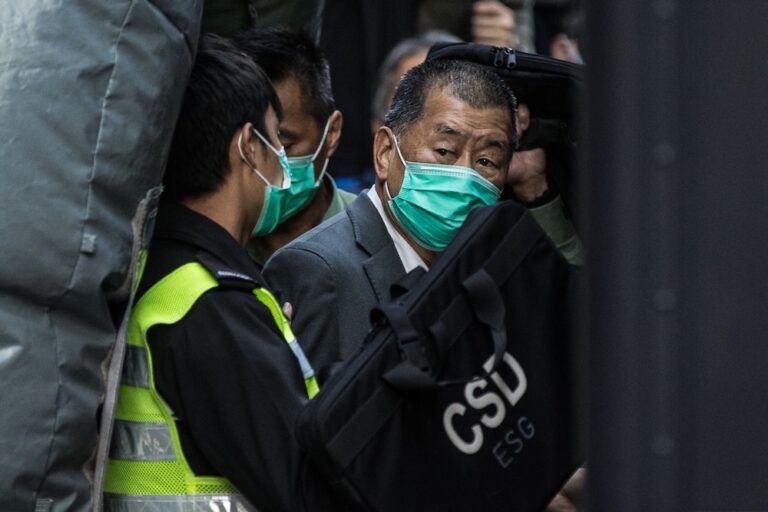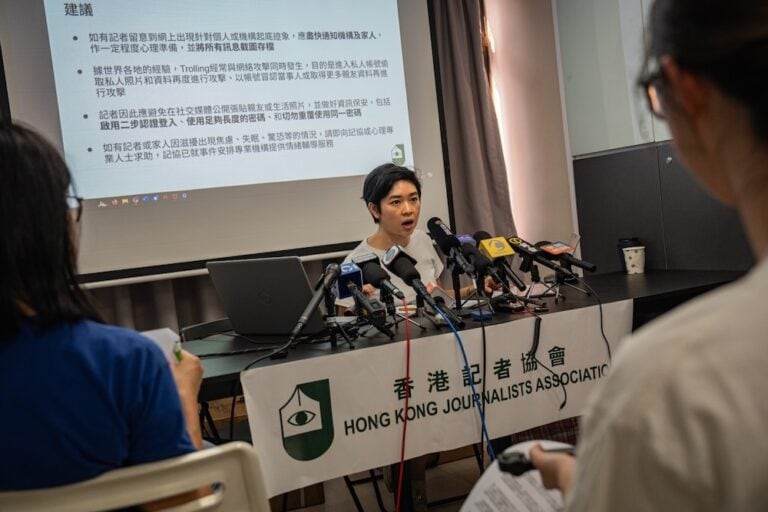This is the first instance of targeted censorship of an overseas media website.
This statement was originally published on article19.org on 7 October 2024.
On Friday, 4 October people in Hong Kong reported that they had lost access to Flow HK, a leading diaspora media outlet. As of Monday, 7 October, the website remains unavailable for most users with Hong Kong IP addresses. As reported by Voice of America, the blockage of Flow HK’s website came after the Hong Kong police sent a notice to the website’s overseas hosting service, Automattic, on 3 September, requesting them to take down the website. Automattic did not comply. While other overseas-hosted websites have been blocked in Hong Kong in recent years, this is the first instance of targeted censorship of an overseas media website.
Michael Caster, ARTICLE 19’s Asia Digital Programme Manager, said:
‘Hong Kong authorities, unsatisfied with having driven independent media into exile and increasingly attempting to silence diaspora leaders through transnational repression, are tightening the muzzle on freedom of expression and access to information by adding Flow HK to its blacklist.
‘Foreign hosting services must continue to resist the long-arm pressure from Hong Kong and Beijing governments to comply with ever-expanding global censorship and transnational repression efforts. Meanwhile, hosting services and internet service providers (ISPs) in Hong Kong should pursue all available measures not to comply with such arbitrary pressure. Failing to resist, they should ensure minimum transparency and communicate such orders to the public. In all cases, access to effective remedy and resumption of content distribution must be ensured. Resisting violations on freedom of expression and information is not just some ethical plea but a fundamental corporate responsibility under the UN Guiding Principles on Business and Human Rights.’
In ordering the block and issuing the notice to Automattic, the authorities’ goal appeared to be the imposition of global censorship of a leading independent voice for people in Hong Kong and among the Hong Kong diaspora. To achieve this, the police claimed powers under Article 43 of the National Security Law (NSL), which empowers the authorities to, among other things, search and seize electronic devices, intercept communications and conduct covert surveillance with approval from the Hong Kong Chief Executive, as well as order a person or service provider to delete information. An Implementation Rule for Article 43 clarifies censorship powers where online content is deemed a potential violation of the NSL, stating that police may order the deletion of content or block the publisher of the content, the platform service provider, hosting service provider and/or network service provider from having access to the content.
In its letter, the Hong Kong police claimed ‘reasonable ground’ for suspecting the website of violating national security. In particular, the notice cited the offences of secession under Article 20, subversion and incitement to subversion under Articles 22 and 23, and collusion with a foreign country or with external elements under Article 29 of the 2020 National Security Law. The police also claimed the website constituted the crime of sedition under section 24 of the 2024 Safeguarding National Security Ordinance. The authorities required Automattic to remove the site within 48 hours or risk a fine of $HKD 100,000 ($12,877 USD) and six months’ imprisonment.
Flow HK, whose Chinese name rushui (如水) means ‘be like water’, a reference to the protest philosophy of the 2019 pro-democracy movement, was founded in 2021 by Hong Kongers based overseas. At the time of the site’s launch, the group announced that, ‘facing unprecedented historical trials, we, who are dispersed in various places, are determined to maintain the unique community of Hong Kong people and hope to pass on the fire of struggle’. Its mission further states: ‘as the regime’s suppression continues to escalate, if we want to continue our spirit of resistance to “be like water”, the movement ‘must re- examine history, criticise existing authoritative discourses, and construct our own discourse.’
Hong Kong national security law is vague and overbroad and can effectively be applied to any content – in violation of international human rights law, which requires very narrow parameters for permissible restrictions on the right to freedom of expression and information.
Since the imposition of the National Security Law, internet censorship has increased. Hong Kong has blocked foreign websites including the website for UK-based human rights organisation Hong Kong Watch and the Taiwan Transitional Justice Commission. Hong Kong authorities have also gone after foreign web hosts to pressure them to remove content. For example, authorities pressured Israel-based Wix to remove exiled pro-democracy activist Nathan Law’s website 2021 Hong Kong Charter, which was temporarily taken offline in 2021. More recently, in May 2024 the Hong Kong Court of Appeals upheld on injunction on YouTube to remove streaming access to the pro-democracy anthem ‘Glory to Hong Kong’. Despite a history of increasing censorship, this is the first time that Hong Kong authorities have blocked a foreign media website.
This year marks the 40th anniversary of the signing of the Sino-British Joint Declaration, which paved the way for the Basic Law, Hong Kong’s mini-constitution. Its preamble lays out adherence to the ‘one country, two systems’ principle, under which Hong Kong would have certain rights that do not exist in the mainland, such as freedom of expression. Hong Kong, unlike mainland China, is furthermore a party to the International Covenant on Civil and Political Rights (ICCPR). Despite this, and ongoing rhetorical commitments to this separation by President Xi Jinping, the crackdown on human rights and fundamental freedoms in Hong Kong increasingly resembles such actions pursued by Beijing.
‘While Beijing continues to claim it upholds the “one country, two systems” principle meant to reassure Hong Kongers of their rights, each move to censor and intimidate only draws Hong Kong closer to the authoritarian image of Beijing,’ said Caster. ‘This year is the 40th anniversary of the signing of the declaration that was meant to promise a minimum of rights in Hong Kong, and it is clear that Beijing is hell-bent on marking that anniversary by adding more fuel to the pyre upon which it is torching its commitments.’



